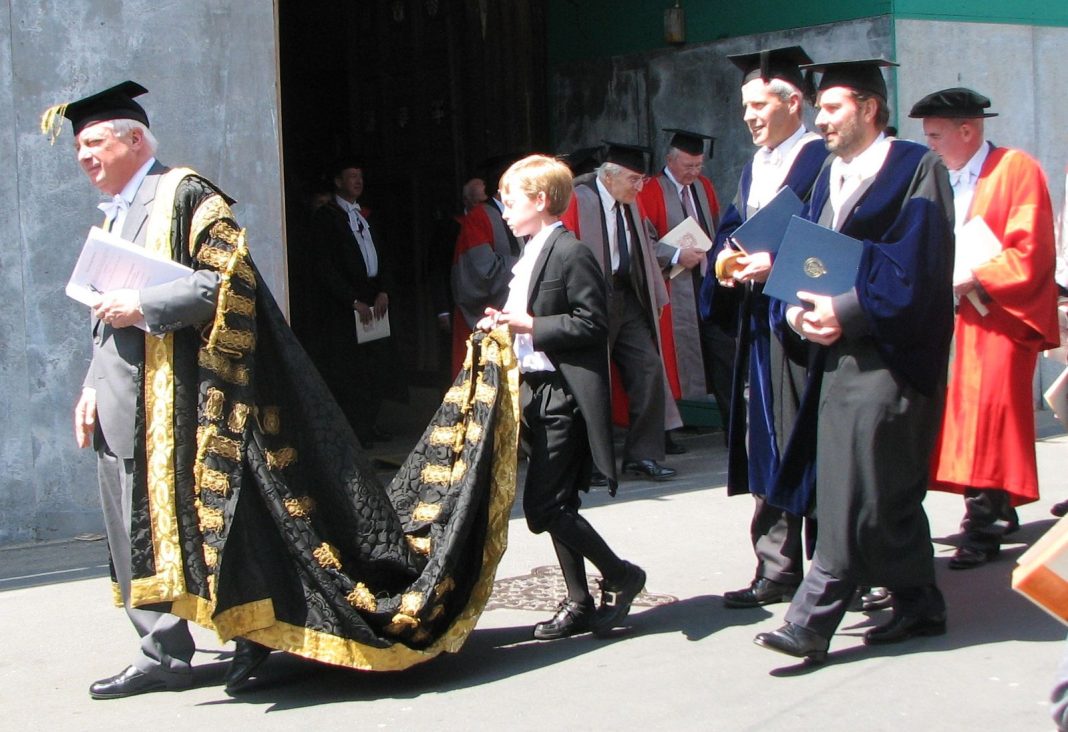The first time I heard of the Chancellor was when he resigned. When researching for this article, my results were flooded with stories about Lord Patten stepping down and his potential successors, but pre-2024: almost nothing. There was one story about an appointment to the Order of the Garter, then copious articles about the Vice-Chancellor. If the main time the institution of the Chancellor generates interest is when he (because in the role’s 800-year history, it has always been a ‘he’) leaves, it suggests the role might be more symbolic than practical.
The institution of the Chancellor began in the 13th century, as every great Oxford tradition does: with the interaction of town, gown, and murder. Following the killing of a woman by a University student, tensions rose to a fever pitch, with three scholars hanged and the rest leaving the city in protest. A solution took five years: a Chancellor, appointed by the Bishop of Lincoln, to oversee certain legal proceedings in cases involving scholars. The judicial function served by the Chancellor in its creation is no longer present today – following section 23 of the Administration of Justice Act 1977, students are once again under the law of the land.
Since the removal of the function for which the office was created, the two Chancellors that have held the post have expressed similar pessimism about its powers. Roy Jenkins, Chancellor from 1973 to 2003, characterised the role as “impotence assuaged by magnificence”. Lord Patten was slightly nicer, calling his position “usefully impotent”.
To be fair, select historical Chancellors have been transformational to the University’s development. Robert Dudley, Chancellor in the 1560s, put the Oxford University Press on a permanent footing. Lord Clarendon’s funding was central to OUP’s success. George Curzon oversaw a tumultuous few decades at the turn of the 20th century, supporting the first women matriculating, the abolishment of compulsory Greek, and formalisation of doctorates, all of which helped create modern Oxford.
But the position doesn’t lend itself towards this kind of impact.
The post demands fundraising efforts, giving speeches to promote the university, and maintaining political goodwill – largely public-facing responsibilities. Such duties are taken very seriously: throughout his 21 year tenure, Lord Pattern represented the University at as many as 60 international events per year, including 16 days in the House of Lords between March 2023 and 2024. The boost the position gives to one’s political career or to one’s legacy, on the cusp of retirement, seems inevitable with this level of publicity.
Across various forms of public opinion, Lord Patten was referred to as a highly successful, arguably exemplary Chancellor. The main events of his Chancellorship appear to be warning of national security risks of academic links with China; wading into the Cecil Rhodes debate firmly on the retaining side, suggesting those who disagreed could ‘be educated elsewhere’; and opening new buildings at LMH. However, the position remains distant from the lives, and at times, interests, of current University students. Undergraduates, after all, are not able to vote in this election.
It’s ironic that, despite representing the University on a global stage, and being so entwined with its reputation, the Chancellor has little structural accountability to enact positive change. There is potential for transformation in the role. Having a figurehead with a foot in the real world could ensure that the city does not become an ivory tower. Furthermore, symbolism does not have to be the same as it’s always been – it would set a bold tone to have the position’s first woman, or person of colour.
With some work, the Chancellor could be instrumental in changing the way that the university is funded. Over the past year, collegiate and University investments have come under scrutiny, with divestment being one of Oxford Action for Palestine’s most prominent demands. Furthermore, contributing to more sustainable financing, by accelerating divestment from fossil fuel funds, would cement Oxford as one of the leaders in the economic effort against climate change. A forward-thinking, innovative Chancellor, could aid the Vice-Chancellor in tackling the significant political challenges that the University faces in our time.
But when the role is weighed down by centuries of existing as a reputational tool, the infrastructure required to fundamentally redefine it is limited. The surrounding superstructure that comes with the role of Chancellor is a burden against the possibility of change: perhaps an institutional shift, such as creating a more substantively powerful Vice Chancellor, and a high-powered fundraising committee, could eliminate the need for a Chancellor at all.
That is, of course, unless you really like the cut of those gold robes.


